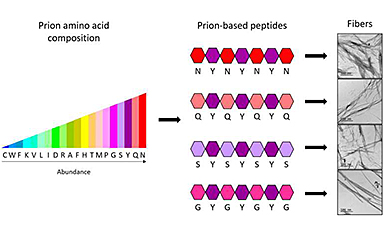Researchers of the Institute of Biotechnology and Biomedicine (IBB-UAB) have generated four peptides, molecules smaller than proteins, capable of self-assembling in a controlled manner to form nanomaterials. The research, published in the journal ACS Nano, was conducted by Salvador Ventura, Marta Díaz Caballero and Susanna Navarro (IBB-UAB), and included the collaboration of Isabel Fuentes and Francesc Teixidor (Institute of Materials Science of Barcelona, ICMAB-CSIC).
In biotechnology, generating functional synthetic amyloid structures to form nanostructures by imitating the natural generation process is not new. The assembly of proteins into stable fibres allows creating supramolecular shapes that no isolated protein can create, and which are used as nanoconductors, photovoltaic structures, biosensors and catalysts.
Quite recently, researchers began synthesizing prion protein sequences to form nanomaterials. The interest in these sequences lies in the fact that the proteins assemble in a slower and more controlled manner, forming highly ordered, nontoxic nanostructures. However, the fact that the sequence is so long, with over 150 amino acids, makes it very difficult and expensive to synthesise.
“We have demonstrated that an adequate design can permit the size of synthetic prion sequences to be reduced down to only 7 amino acids, while conserving the same properties. The four peptides we have fabricated are the shortest structures of this type created until now, and are capable of forming stable fibril assemblies,” says Salvador Ventura, researcher at the IBB and the UAB Department of Biochemistry and Molecular Biology.
Image Credit: Credit: IBB-UAB
News This Week
New Toothpaste Stops Gum Disease Without Harming Healthy Bacteria
Researchers have developed a targeted approach to combat periodontitis without disrupting the natural balance of the oral microbiome. The innovation could reshape how gum disease is treated while preserving beneficial bacteria. The human mouth [...]
Plastic Without End: Are We Polluting the Planet for Eternity?
The Kunming Montreal Global Biodiversity Framework calls for the elimination of plastic pollution by 2030. If that goal has been clearly set, why have meaningful measures that create real change still not been implemented? [...]
Scientists Rewire Natural Killer Cells To Attack Cancer Faster and Harder
Researchers tested new CAR designs in NK-92 cells and found the modified cells killed tumor cells more effectively, showing stronger anti-cancer activity. Researchers at the Ribeirão Preto Blood Center and the Center for Cell-Based [...]
New “Cellular” Target Could Transform How We Treat Alzheimer’s Disease
A new study from researchers highlights an unexpected player in Alzheimer’s disease: aging astrocytes. Senescent astrocytes have been identified as a major contributor to Alzheimer’s progression. The cells lose protective functions and fuel inflammation, particularly in [...]
Treating a Common Dental Infection… Effects That Extend Far Beyond the Mouth
Successful root canal treatment may help lower inflammation associated with heart disease and improve blood sugar and cholesterol levels. Treating an infected tooth with a successful root canal procedure may do more than relieve [...]
Microplastics found in prostate tumors in small study
In a new study, researchers found microplastics deep inside prostate cancer tumors, raising more questions about the role the ubiquitous pollutants play in public health. The findings — which come from a small study of 10 [...]
All blue-eyed people have this one thing in common
All Blue-Eyed People Have This One Thing In Common Blue Eyes Aren’t Random—Research Traces Them Back to One Prehistoric Human It sounds like a myth at first — something you’d hear in a folklore [...]
Scientists reveal how exercise protects the brain from Alzheimer’s
Researchers at UC San Francisco have identified a biological process that may explain why exercise sharpens thinking and memory. Their findings suggest that physical activity strengthens the brain's built in defense system, helping protect [...]














Leave A Comment